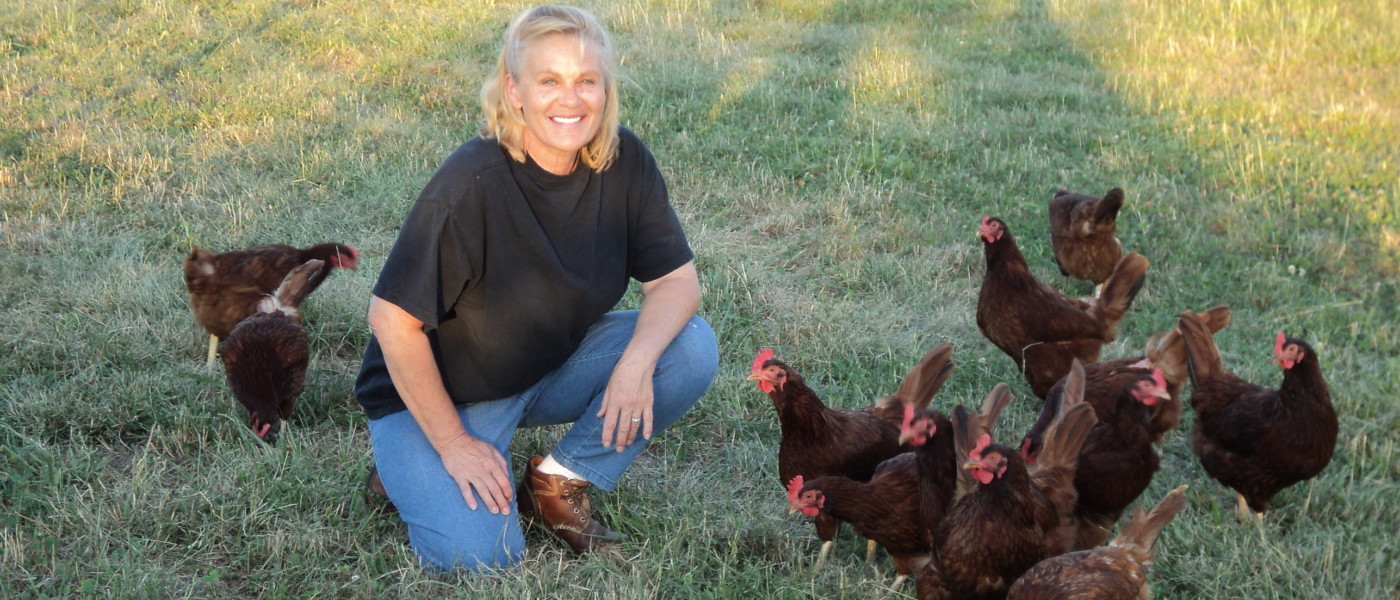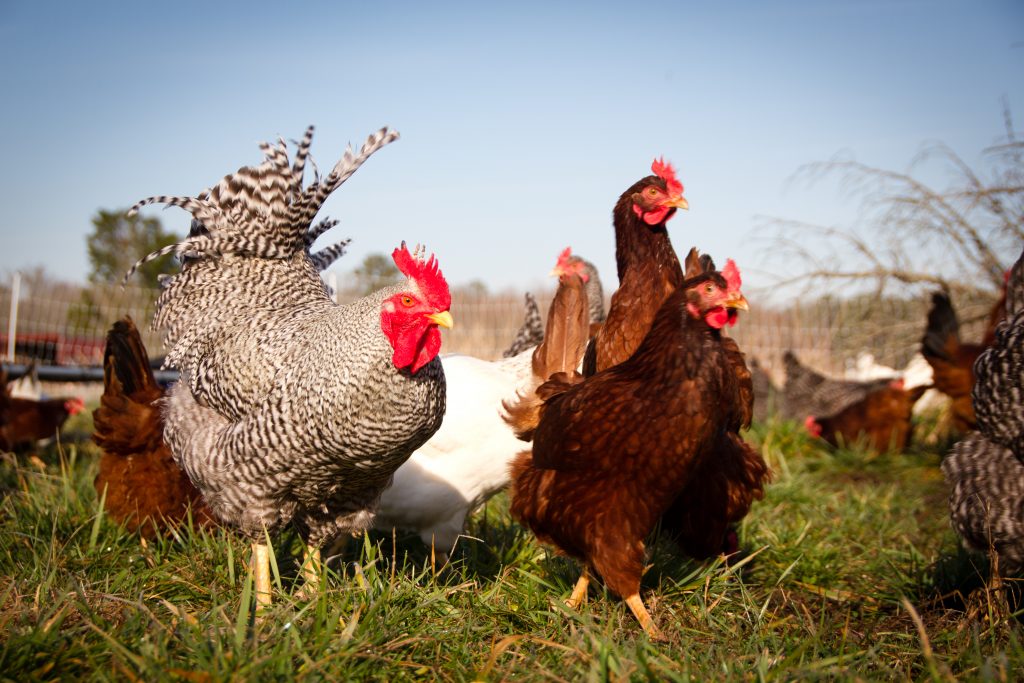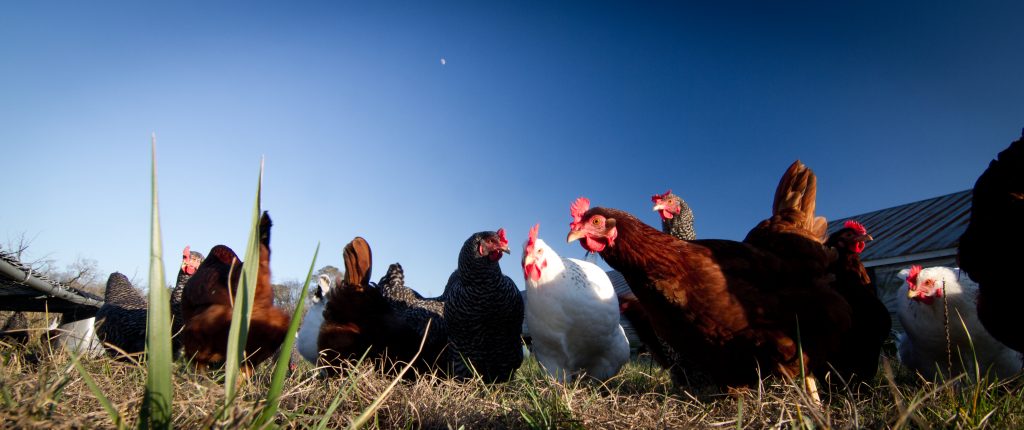If people know Carole Morison, it’s usually because of her appearance in Food, Inc., the 2008 Oscar-nominated documentary that introduced viewers to the corporate-powered industrial food system.
Carole appears in the film with the camera following her into a cramped poultry house on her farm in Pocomoke City, Maryland, where she and her husband Frank have grown chicken under contract for Perdue since 1985. An ocean of feathers unfurls in front of Carole’s feet as she moves around to pick up dead birds. The camera zooms in on birds with labored breathing, covered in their own waste and often too weak to walk. It was one of the first times Americans got a glimpse into how their chicken is raised, and it’s a sobering scene.
“It’s the same story with everyone.” Carole recalls of her experience in the industry. “It all looks good until you’re in it. Then things start changing rapidly. By the time Food, Inc. came around, we had had it with raising chickens this way.”
Among the issues weighing on Carole was a rapidly emerging controversy over the health of the Chesapeake Bay, the country’s largest estuary and a vital ecosystem to the Delmarva Peninsula, which is occupied by Delaware, Maryland and Virginia. Agriculture (and manure from poultry operations in particular) is one of the largest sources of the bay’s pollution.
“The industry denies it all the time and then they push the manure issue off on the farmer,” she asserts. “At first I started fighting back, hoping there would be some changes. But the poultry industry is an industry that does not want to change. It got to the point where the whole concept of how they were raising farm animals, all the environmental issues, and the contracts – they all started to weigh on me and my husband.”
For years, Carole and Frank had planned for the possibility of being terminated from their contract with Perdue. They took off-farm jobs – an unfortunate necessity for most of America’s farmers – and were extraordinarily frugal, forgoing vacations and anything but the most modest Christmas presents. It was a good thing they did.
Before Food, Inc. even hit theaters, Perdue let the Morisons know they were unhappy for allowing a film crew on the farm. They told them that they were in violation of Perdue’s biosecurity policy – a policy Carole had never seen or heard of before. Then Perdue demanded upgrades to the Morisons’ poultry houses – specifically, a shift to a tunnel-ventilated system – that would have cost them hundreds of thousands of dollars.
“About three weeks before we got our termination letter,” Carole remembers. “They gave us the Outstanding Producer Award, which means we did better than all the other farms that week. I said, ‘Well, if we are number one, why would we spend the money to upgrade? We’re beating those newer kinds of houses.’ But there was no discussion.”
While Carole describes the exit from the contract poultry industry as a huge weight off her shoulders, she and Frank were left with two huge poultry houses and a future that remained unclear. Luckily, the speaking tour for Food, Inc., where Carole got to meet farmers and see farms of all different types, pointed her in a new direction.
“In California, I heard there was a farm with 4,000 chickens on pasture,” she explains. “I was like ‘I have got to see this. There’s no way this lady’s doing that!’ Coming from a non-farming background, the only thing I had ever seen was contract farming. I spent an entire afternoon sitting outside at her farm, watching these chickens run around. I was amazed.”
Those moments in the fields were the seeds for Carole’s new farm, called Bird’s Eye View Farm. But there were several hurdles on the path. First, it took about a year to convince Frank to try a pasture-based operation. And while they were accustomed to working with broilers (chickens raised for meat), the complete lack of independent feed mills, hatcheries or processing plants on the Delmarva Peninsula meant there was no infrastructure to successfully pull off a pastured chicken farm.
All told, their poultry houses remained empty for three years. Finally, Carole decided to order hens for egg laying. They retrofitted one of the chicken houses with perches, windows and doors to allow the animals to exercise their natural behavior and have a safe space to roost in at night. They were also able to use some of the existing equipment, like the automatic feeders and drinkers. Compared to the upgrades typical in the contract system, these changes were affordable.
“We have 500 hens. I didn’t realize how many eggs there would be,” explains Carole. She had initially planned to sell to farmers’ markets, but there was far too much product for that. “I had so many eggs, I was donating them to Catholic charities for food banks.”
Then Whole Foods Market contacted her. It took six months to work out specifics for the sourcing arrangement – since “they’re pretty strict” – and then Carole’s eggs were in their stores. She remains their only Maryland producer in the 43 stores of the Mid-Atlantic region. “Whole Foods can’t get enough pasture-raised eggs,” she states.
There’s money to be made outside the industrial system. It’s a viable business. I make more with 500 hens in one year than I did with 54,000 birds under contract. That’s net, after everything’s paid.
Trial, error and careful observation of the chickens helped Carole establish their system. They enrolled in the Animal Welfare Approved (AWA) certification program because, Carole explains, “They have the most stringent standards.” AWA provided technical guidance to ensure that the farm would meet or exceed the organizations standards. The main flock is rotated on 14 acres of pasture made up of timothy, orchard grass and clover. Every two months, the chickens are moved to another field and Carole reseeds the grazed one. This kind of rotational pasture is easier on the environment, incorporating the manure into the soil and thereby strengthening it. The rotational grazing also helps avoid disease issues and parasites by keeping the birds moving to new tracts of land. Since chickens will only eat about 30 percent of their diet from pasture, worms and bugs, Carole supplements with a corn-soybean mixture from an independent feed mill in Pennsylvania.
A few years ago, Carole was awarded a USDA Value Added Producer Grant (VAPG) to do a feasibility study, market analysis and business plan on her pasture system. At one point, they increased the flock to 1,200 hens and were considering increasing to 5,000 hens since the land can handle it.
A family medical issue forced them to scale back to 500 hens, but Carole shares, “There’s money to be made outside the industrial system. It’s a viable business. I make more with 500 hens in one year than I did with 54,000 birds under contract. That’s net, after everything’s paid.”
Their success has local farmers noticing, even if they’ve been in the contract poultry system for a long time. “They like what they see, but they’re afraid to take that step,” she observes. “It’s 100 years that the poultry industry and contract farming has been around. It’s a mentality. It’s a conditioning in our area.”
In a time when the market for local is expanding, Carole now also sells eggs directly from her farm. “Consumers care that they’re supporting a local farmer. I love interacting with people who come to the farm. We bought an old travel camper and took out the insides. We put it on a different piece of property with 40 hens and a couple of roosters so people can interact with the chickens. We get a lot of visitors. Classes from the colleges. School kids. An elementary class trip to see where your eggs come from. The hens like visitors. They’ll run right to you.”
Her voice is animated as she talks about her chickens. “It’s just totally different,” she exclaims. “These chickens are fun. They are so active and busy. Nothing like the industrial chickens, which couldn’t walk more than 15 steps. Their bones wouldn’t support the weight. We’re using traditional hens now and their genetics are untouched.”
As she considers what she finds most rewarding about her journey, Carole offers the following: “When I get really stressed out, I will go and sit out in the middle of the field and watch the chickens. I can do that for an hour and I feel better,”
“Now I know why people farm. Contract farming was a burden. This is a joy.”






